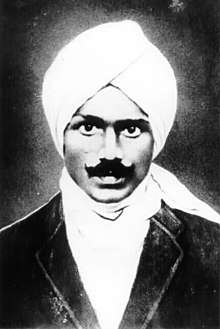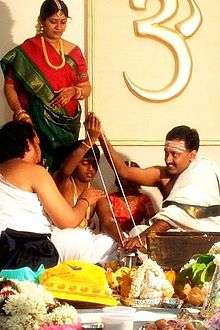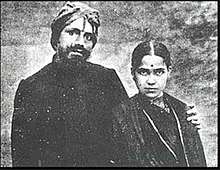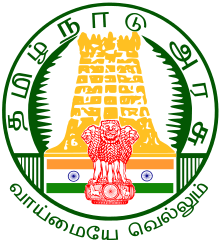Subramanya Bharathi (11 December 1882 – 11 September 1921) was a Tamil poet from Tamil Nadu, India, an independence activist and iconoclastic reformer. Also known as Bharathy, and Mahakavi Bharathi (the laudatory epithet Maha Kavi meaning Great Poet in many Indian languages), he is celebrated as one of India's greatest poets.
Quotes
- The Devil is a Five-headed
Snake, says the father.
The son says, Nay, it's a Six-headed one.And then their hearts burn
with hate for each others —
and they live apart for many years.- "When I Think Of My People Broken Down", as translated in "The Poetry of Sri Lanka" Journal of South Asian Literature, Vol. 12, No. 1 (Fall-Winter 1976), published by Asian Studies Center, Michigan State University, p. 11
- Unbearable becomes the pain in my heart —
When I think of my people, broken down,
broken by disease in mind and limb.On the edge of life they always linger;
For countless are the diseases
Of Ignorance and Hunger.And on treacherous paths to Slavery
like children blind, they would walk behind
strangers from over the sea.O, divine Land, blessed by the gods!
O, ancient Mother of Culture and Art!
Thy children today are spineless hordes.- "When I Think Of My People Broken Down", as translated in "The Poetry of Sri Lanka", in Journal of South Asian Literature, Vol. 12, No. 1 (Fall-Winter 1976), published by Asian Studies Center, Michigan State University, p. 11
- Fools! Do you argue, that things ancient ought, on that account, to be true and noble! Fallacies and Falsehoods there were from time immemorial, and dare you argue that because these are ancient these should prevail?
In ancient times, do you think that there was not the ignorant, and the shallow minded? And why after all should you embrace so fondly a carcass of dead thoughts. Live in the present and shape the future, do not be casting lingering looks to the distant past for the past has passed away, never again to return.
- யாமறிந்த மொழிகளிலே தமிழ்மொழி போல்
இனிதாவது எங்கும் காணோம்po- Among all the languages we know, we do not see anywhere, any as sweet as Tamil.
- As quoted in Freedom Fighters of India, Vol. 3, Lion M. G. Agrawal (2008), "Subramaniya Bharathi", p. 235
- Among all the languages we know, we do not see anywhere, any as sweet as Tamil.
- ஜாதி மதங்களைப் பாரோம் -
உயர் ஜன்மம்இத் தேசத்தில் எய்தின ராயின்
வேதிய ராயினும் ஒன்றே -
அன்றி வேறு குலத்தின ராயினும் ஒன்றே
- கவிதை எழுதுபவன் கவியன்று. கவிதையே வாழ்க்கையாக உடையோன், வாழ்க்கையே கவிதையாகச் செய்தோன், அவனே கவி
- He who writes poetry is not a poet. He whose poetry has become his life, and who has made his life his poetry — it is he who is a poet.
- English translation originally from "Subramaniya Bharathi" at Tamilnation.org, also quoted in "Colliding worlds of tradition and revolution" in The Hindu (13 December 2009)
- He who writes poetry is not a poet. He whose poetry has become his life, and who has made his life his poetry — it is he who is a poet.
Quotes about Bharathi
- Bharathi was a Hindu. But his spirituality was not limited. He sang to the Hindu deities, and at the same time he wrote songs of devotion to Jesus Christ and Allah.
- Lion M. G. Agrawal, in Freedom Fighters of India, Vol. 3, (2008), p. 235
- Driving away fear, breaking the bonds of servitude,
Rooting out ignoble thoughts raised the nation,
That it may reach lofty heights in the world,
The immortal poet who conquered Time!“All are one caste” proclaimed he,
Defiling discriminations driving away,
Arrived the immortal poet — the cascade of words,
And a flame burst of fiery heroism!- Shuddhananda Bharati, in Poet Nightingale : Subramaniya Bharathiyar (1955)
- Bharati's passion for social causes and his wilful disregard for what others thought or said of him made him a perfect lightning rod for controversy. In 1913, in one of the most debated acts of his life, he performed the sacred thread ceremony for a Dalit, Kanakalingam.
- Arroon Raman, in "All too human at the core" in The Hindu ((20 December 2009)
- Though Bharathi died so young, he cannot be reckoned with Chatterton and Keats among the inheritors of "unfulfilled renown". His was a name to conjure with, at any rate in South India, while he was still alive. But his fame was not so much as a poet as of a patriot and a writer of patriotic songs. His loudly expressed admiration for Tilak, his fiery denunciations in the Swadesamitran, and the fact that he had to seek refuge in French territory to escape the probing attentions of the Government of Madras, made him a hero and a "freedom fighter". His lilting songs were on numerous lips, and no procession or public meeting in a Tamil district in the days of "non-cooperation" could begin, carry on or end without singing a few of them... Bharathi's love of Tamil, both the language as it was in his own day and the rich literature left as a heritage, was no less than his love of India... When he claims for Valluvan, Ilango and Kamban, Bharathy does so not as an ignorant chauvinist but as one who has savoured both the sweetness of these writers and the strength and richness of others in Sanskrit and English...
- P. S. Sundaram, in Poems of Subramania Bharathy - A Selection (1982)
- He loved Thamizh and India with a passion and was proud of his cultural heritage. At the same time he was fully cognizant of the social repercussions of caste differences and how superstitions and blind faith in the old traditions have lead to stagnation.
More important is the fact that he had the courage and tenacity to stand up before a ruthless imperial power and was prepared to face all the personal consequences. The only weapon he had at his disposal to achieve his cherished goal was not wealth or physical ability but only his literary skill.- Nadesan Satyendra, in "Some Reflections", at TamilNation.org
External links
- "Subramaniya Bharathi" at Tamilnation.org
- The People's Poet
- Profile at Made In Thoughts
- Poet Nightingale Bharathiyar, by Kavi Yogi Dr. Shuddhananda Bharati
- Selected Bharathi Poems (in Tamil with links to English translations)
- Bharathiyar Song at YouTube
- Bharathiyar Song at YouTube
- Bharathi Songs (in Tamil)
- Complete Works of Maha Kavi Subramaniya Bharathy (in Tamil)
- Works of Bharati (in Tamil)
- Poetry of Subramanya Bharathi in Punjabi at punjabi-kavita.com



